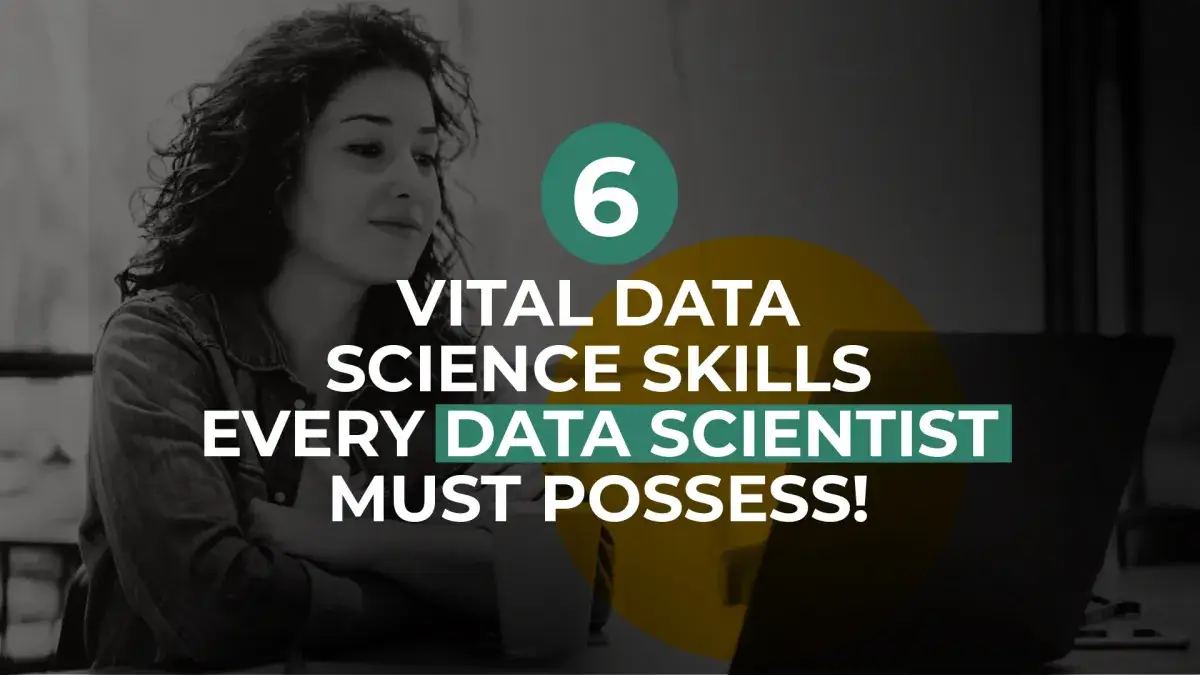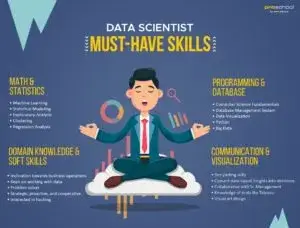6 Vital Data Science Skills Every Data Scientist Must Possess!

Here's What We've Covered!
Acquiring the required data science skills has become a very prominent essential if you’re looking to become a data scientist. As such, data scientist is one of the top-notch job roles wherein highly essential skilled aspirants are queuing to work!
While many of you may have the right abilities and expertise, it is also important that you showcase them well.
Data Science is a highly complex and niche segment and it requires a bag full of skills. Amongst them there are a few qualities that are must have on your resumes.
We have listed 6 knowledge elements which are a must for every Data Scientist. Here it goes:
(1) Statistical skills:
Data Science skills is all about deciphering the underlying insights from the data sets, which involves a strong command over statistics. As a budding Data Scientist, you should be well-versed with concepts like testing hypotheses, distributions, Bayesian Analysis, Identifying the best estimator, Parameter estimation etc.
A mastery over core statistical concepts like Linear Regression, Time-series Analysis and non-straight regression are also quintessential attributes of a Data Science.
(2) Mathematical skills:
Certain mathematical concepts like Multivariate Calculus, Liner Algebra, and Probability theory form the basis for Data Science. Most of the Data Scientists have a strong knowledge about Applied Mathematics which helps them to sail through their role with ease.
Even those who do not have a background in mathematics need to gain a strong foothold in these concepts. We have observed that the companies usually prefer candidates who have an academic qualification in Maths and Stats such as Ph.D, Masters in Applied Mathematics, Masters in Statistics, etc.
(3) Programming skills:
It goes without saying that for a rewarding career in Data Science, you must have a strong computing mind set and the ability to understand codes. An expert level knowledge of programming languages play a big role in determining your success in your career as a Data Scientist. To begin with, the knowledge of R is a must-have in the kitty.
R is a programming language that is used in most of the statistical problem-solving in Data Science and is specially designed for the scientists. Python is also a widely-used language in Data Science and is relatively simpler to grasp and use.
Python can also be used across large data-sets and also in creating data sets. More than half of the world’s Data Scientists vouch for Python as the foundation for executing data analysis projects.
(4) Participation in real-world events:
Today there are a lot of hackathons, events, coding seminars and Data science meets organised by leading companies to groom young talent and also scout for the best. Participation in these events not only helps you to network easily but also broaden your knowledge horizon to face real-world challenges.
Bootcamps, Workshops on AI and Machine Learning help you in taking your skills to a whole new level and also gives you an edge over other candidates who are more focussed on theoretical concepts. Some of the well-known events for Data Science are Data Science Congress, Practicla Machine Learning & Data Science Workshop, DataHack Summit etc.
(5) Comfort with unstructured data:
Data Scientists have to work with vast amounts of data most of which is also unstructured. This data is taken from obscure places, social media, videos, blogs, audios, web sites, and other open data sources.
Sanitizing such data sets and structuring them into an organised pattern requires an eye for detail and a sorted thought process. There are many software and tools such as Hadoop, Apache, NoSQL, Polybase to handle unstructured data and a data scientist should be able to handle them very well.
(6) Data Storytelling:
Knowing how to present your insights is as important as being able to handle to derive these insights. The insights have to be presented in a form that is relatable to the various stakeholders. Data Scientists who are adept at this present their findings through Data Visualisation techniques and weave the insights into a story that is crisp, engaging and relatable to everyone involved in the decision making process.
The various tools that aid the Data Scientists in visualisation and storytelling is Tableau, Plotly, Chart.js, DataHero etc. Presenting the data in an easily comprehensible manner helps the decision makers to understand complex insights better, thus aiding faster decision-making.
Resent Post
>
Best Study Abroad Courses for Commerce Graduates
>
Emerging commerce career options in India (2026): From CA to Data Analyst
>
ACCA Opportunities You Didn’t Know About – Think Beyond Audit!
>
Which Courses After 12th Commerce With High Salary Are in Demand Worldwide?
>
How to Find ACCA Jobs Online After Qualifying: Real Portals, Tips & Career Guidance
Follow Us For All Updates!




